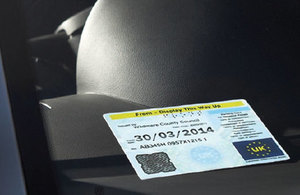People with hidden disabilities could enjoy new freedom with Blue Badge changes
Consultation expanding the Blue Badge criteria released.

Image of Blue Badge displayed in car.
People with hidden disabilities could soon have greater access to blue badges under new plans from Transport Minister Jesse Norman today (21 January 2018).
The proposals, which would herald the most significant changes since the blue badge was introduced in 1970, would help remove barriers to travel for people with conditions such as dementia and autism, allowing them better access to work, shops and amenities. This is part of the drive for greater parity between the treatment of physical and mental health conditions.
Currently, about 2.4 million disabled people in England have a blue badge, allowing them to park on roads without charge and normally without time limit. Around 75% of blue badge holders say they would go out less often if they didn’t have one.
Transport Minister Jesse Norman said:
Blue badges give people with disabilities the freedom to get jobs, see friends or go to the shops with as much ease as possible.
We want to try to extend this to people with invisible disabilities, so they can enjoy the freedom to get out and about, where and when they want.
The changes could also see a variety of healthcare professionals, who are better placed to identify if mental health causes mobility issues, carry out assessments to determine if a blue badge should be given.
Sarah Lambert, Head of Policy at the National Autistic Society, said:
The National Autistic Society welcomes this government proposal. It could mean that many more autistic people will qualify for a Blue Badge, which can be a lifeline.
There are an estimated 700,000 autistic people in the UK and whilst every person on the autism spectrum is different, for some, not being able to park in a predictable place close to a destination can cause a great deal of anxiety and put their safety at risk. Some autistic people can experience too much information from the environment around them on public transport, while other autistic people might not be aware of dangers on the road.
However, current Blue Badge rules mean that all-too-often autistic people don’t qualify. The National Autistic Society has raised this issue with government over recent years and we are pleased to see they have listened to the concerns of autistic people and their families. We hope the government will make this important change and we look forward to working with them to make sure that autistic people and their families benefit.
Councils have different interpretations of the existing rules with some recognising hidden disabilities, but the changes proposed would give a clear and consistent guidelines for the whole of England.
The consultation will last 8 weeks.
Roads media enquiries
Media enquiries 0300 7777 878
Switchboard 0300 330 3000